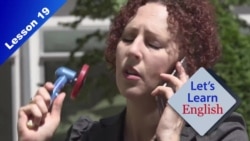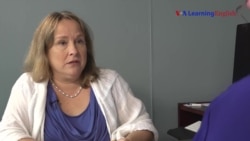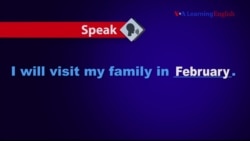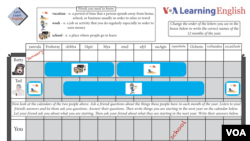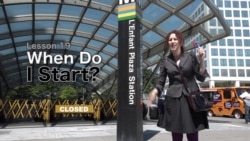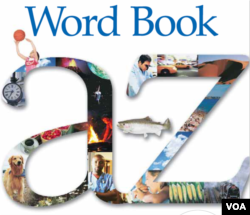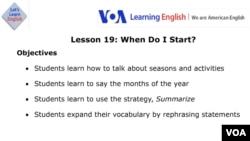Summary (Ringkasan)
Anna has to walk to work because the Metro is closed. She calls to tell her boss she is late. Ms. Weaver wants her to come and talk about a new assignment. What will Anna do?
Anna harus berjalan kaki ke kantor karena Metro (kereta) sedang tutup. Ia menelepon bosnya untuk memberitahu bahwa ia telat. Ms. Weaver ingin membicarkan mengenai tugas baru Anna. Apa yang akan Anna lakukan?
Speaking (Berbicara)
Learn to pronounce the new words for this lesson and the months of the year. Learn about using which for offering choices and every or next with time words.
Coba belajar untuk mengucapkan kata-kata baru di pelajaran kali ini dan beberapa bulan dalam setahun. Dan juga, belajar menggunakan which untuk menawarkan pilhan dan every atau next dengan kata-kata menunjukkan jam.
Pronunciation (Pengucapan)
In this video, learn how English speakers say the second month of the year.
Di video ini, coba belajar bagaimana pembicara yang berbahasa Inggris mengucapkan bulan ke dua dalam satu tahun.
Conversation (Percakapan)
Writing (Menulis)
What are your skills? Do you use them at work or at school? Tell us about a couple of skills you have. Write to us by email or in the Comments section. Click on the image below to download the Activity Sheet and practice talking with a friend about what you do at different times of the year.
Apa keahlian Anda? Apakah Anda gunakan di kantor atau sekolah? Beri tahu kami beberapa keahlian Anda. Email kami atau tulis di kolom komentar. Klik gambar di bawah untuk mengunduh Lembar Kerja dan berlatih bicara dengan seorang teman tentang apa yang Anda lakukan dalam satu tahun.
Learning Strategy (Strategi Belajar)
Learning Strategies are the thoughts and actions that help make learning easier or more effective.
The learning strategy for this lesson is Summarize. In this week's video, you hear Ms. Weaver tell Anna, "Well, you are good at asking questions. You are good at talking to people. You are good at showing your feelings. And you are great at being silly." Anna does not understand why Ms. Weaver is telling her about her skills. She asks, "But what does all that mean?"
Strategi belajar untuk pelajaran ini adalah Summarize. Pada video minggu ini, Anda dengar Ms. Weaver berkata pada Anna, "Well, you are good at asking questions. You are good at talking to people. You are good at showing your feelings. And you are great at being silly." Anna tidak mengerti kenapa Ms. Weaver memberitahunya tentang keahliannya. Ia bertanya, "But what does all that mean?"
Quiz (Tes)
Test your understanding by taking the listening quiz. Listen to the short video, then choose the best answer.
Tes pemahamanmu dengan mengerjakan tes ini. Mainkan videonya, lalu pilih jawaban yang paling benar.
______________________________________________________________
New Words (Kata-kata Baru)
______________________________________________________________
Free Materials
Download the VOA Learning English Word Book for a dictionary of the words we use on this website.
Each Let's Learn English lesson has an Activity Sheet for extra practice on your own or in the classroom. In this lesson, you can use practice talking with a friend about what you do at different times of the year.
Unduh VOA Learning English Word Book sebagai kamus kata-kata yang digunakan di situs ini.
Masing-masing pelajaran dalam Let's Learn English, ada Activity Sheet agar Anda bisa belajar sendiri atau di kelas. Di pelajaran kali ini, Anda bisa menggunakannya untuk berlatih berbicara dengan teman tentang apa yang dilakukan pada waktu yang berbeda di sepanjang tahun.
For Teachers
See the Lesson Plan for this lesson for ideas and more teaching resources. Send us an email if you have comments on this course or questions.
Grammar focus: Which as an adjective alone and with pronouns; Adjectives next and every
Topics: Saying the months of the year; Talking about seasons and activities
Learning Strategy: Summarize
Speaking & Pronunciation Focus: Using which and which one to offer a choice; using every and next with time expressions; Pronunciation of February
______________________________________________________________
Now it's your turn. Send us an email or write to us in the Comments section below or on our Facebook page to let us know what you think of this lesson.
Special request to teachers and English learners:
As you see in this lesson's video, Anna is going to have a new children's program. What should she call the program? Let us know in the Comments section or by email. We'll send a special thank you to the person who suggests the best name.




